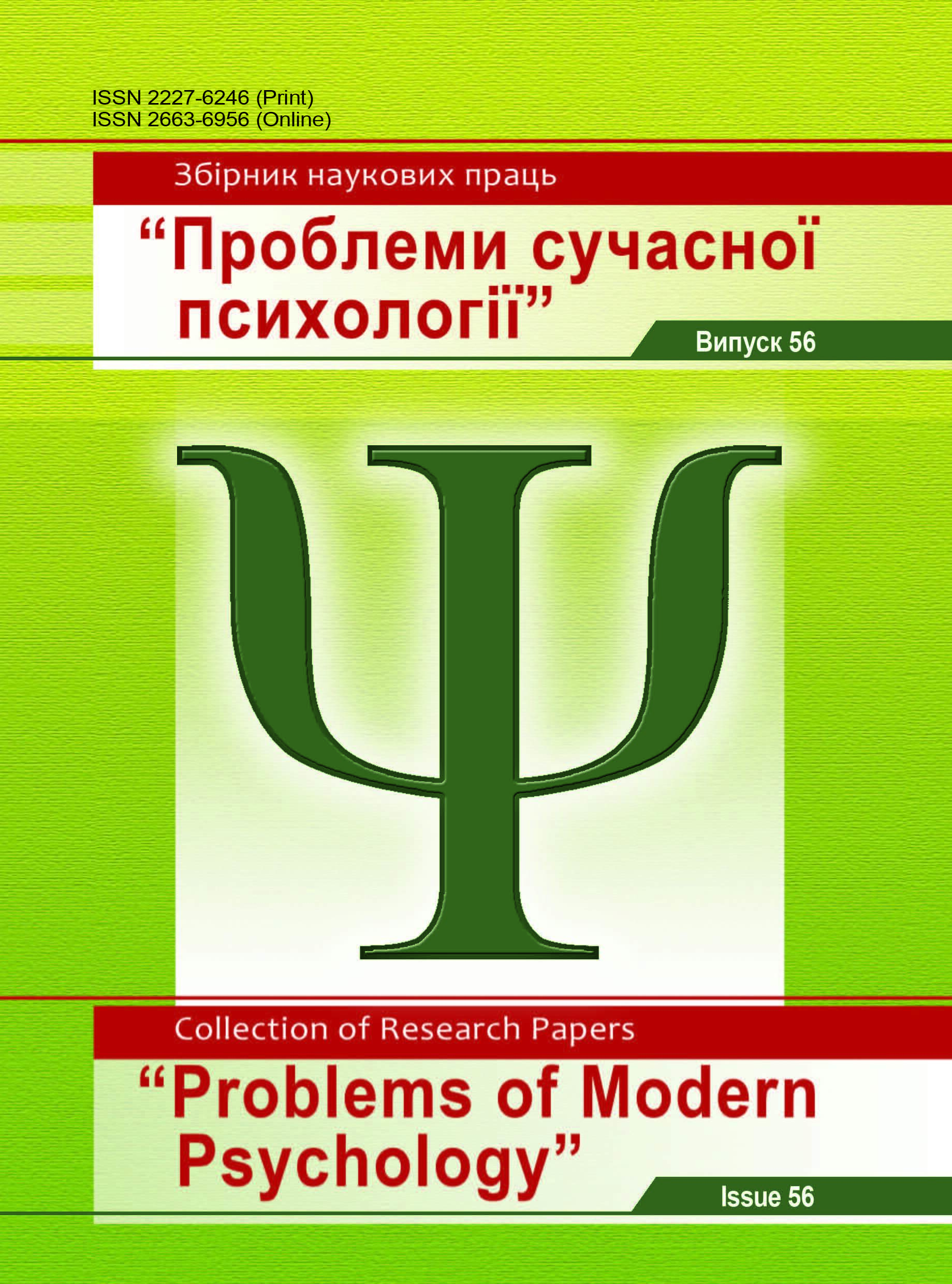The Process of Facilitative Learning as the Basis of the Humanization of Education
DOI:
https://doi.org/10.32626/2227-6246.2022-56.171-188Keywords:
facilitative learning, the humanization of education, cognitive activity, physical and mental health, productive facilitative activity of pupils, non-productive facilitative activity of pupilsAbstract
The purpose of our research is: to develop (by the type of speech reaction) four types of transformation utterances of facilitative interaction at lessons, which depend on the processes of internal interference and conceptual correlation of the definition “facilitative learning as the basis of the humanization of education”; to organize the pilot research of facilitative interaction of pupils at the English lesson (form 5-A, 42 pupils, school № 12, Rivne) during 2020-2021 years.
Methods of the research. The following theoretical methods of the research were used to solve the tasks formulated in the article: a categorical method, structural and functional methods, the methods of the analysis, systematization, modeling, and generalization. Also in our research we used the empirical method of the pilot experiment.
The results of the research. In order to test our hypothesis about facilitative activity of pupils, its productivity or non-productivity, we compared the results of respondents’ cognitive activities when they worked alone and in the case of the implementation of facilitative activity in the presence of observers. It is proved that these two indicators were correlated again after some training (when cognitive activity was performed several times). While testing our hypothesis, it was found the most accurate physiological indicator to register changes in the level of arousal of the personality. A similar research was organized the next month. In this research, pupils performed appropriate tasks to actualize psychomotor skills in the presence of observers. The results showed that the presence of ten passive observers during the mastery of a highly complex of mental and psychomotor skill worsened the activity of respondents significantly at the beginning of the empirical study compared to training alone.
Conclusions. It was proved, that C. Rogers’ ideas on the importance of the process of facilitative learning, the role of the teacher, his/her facilitative relationships with pupils were the basis for the humanization of education abroad, and the main empirical research was provided in the 60-70’s. The results of the facilitation training, which involved thousands of teachers and tens of thousands of primary, secondary and college schoolchildren in England and the United States, suggested that pupils’ personal development had also been improved: their self-esteem had been improved, cognitive abilities had been developed, which facilitated the improvement of physical and mental health, performance and the activity of schoolchildren. C. Rogers’ humanistic ideas, which contribute to the growth of educational potential, are especially important for the democratization of the Ukrainian school and our society. In the theory of C. Rogers we often see implied system of certain ideas about a man and his/her essence, or a special method of psychotherapy, or just a set of carefully designed techniques for correcting interpersonal relationships.
References
Honcharuk, Nataliia, & Onufriieva, Liana (2018). Psykholohichnyi analiz rivniv pobudovy komunikatyvnykh dii [Psychological analysis of the levels of construction of communicative actions]. Psycholinguistics. PsykhoUnhvistyka. Psikholingvistika - Psycholinguistics. Psycholinguistics. Psycholinguistics, 24(1), 97-117. Retrieved from https://doi.org/10.31470/2309-1797-2018-24-1-97-117 [in Ukrainian].
Ivashkevych, Er., & Komarnitska, L. (2020). Psychological aspects of comics as the paraliterary genres. Zbirnyk naukovykh prats «Prob- lemy suchasnoi psykholohii» - Collection of research papers “Problems of modern Psychology", 49, 106-130. Retrieved from https://doi.org/10.32626/2227-6246.2020-49.106-130.
Mykhalchuk, N., & Onufriieva, L. (2020). Psychological Analysis of Different Types of Discourse. Zbirnyk naukovykh prats «Problemy suchasnoi psykholohii» - Collection of research papers “Problems of modern Psychology", 50, 188-210. Retrieved from https://doi.org/10.32626/2227-6246.2020-50.188-210.
Allport, G.V. (1998). Lichnost v psikhologii: Teorii lichnosti [Personality in Psychology: Theories of Personality]. Moskva; St. Petersburg: KSP: YUVENTA [in Russian].
Onufriieva, L., & Ivashkevych, Ed. (2021). The development of learner’s autonomy by the way of the formation of social intelligence. Zbirnyk naukovykh prats «Problemy suchasnoi psykholohii» - Collection of research papers “Problems of modern psychology", 51, 9-32. Retrieved from https://doi.org/10.32626/2227-6246.2021-51.9-32
Rogers, C.R. (1983). Freedom to learn for the 80S. Columbus: Charles E. Merril Publ. Co.
Downloads
Published
How to Cite
Issue
Section
License
Copyright (c) 2022 Khupavtseva Nataliia, Lohvina Oksana

This work is licensed under a Creative Commons Attribution-NonCommercial 4.0 International License.
Copyright
The Editorial Board has the full right to publish original scientific papers containing results of theoretical and experimental research works which are not currently subject to review for publication in other scientific editions. The Author shall transfer to the editorial board of the Collection the right to spread the electronic version of the paper, as well as the electronic version of the paper translated into English (for papers originally submitted in Ukrainian and Russian) by all kinds of electronic means (placement at the official website of the Collection, electronic databases, repositories etc).
The Author of an article reserves the right to use materials of the paper, without approval with the editorial board and the founders of this Collection: a) partially or fully, for educational purposes; b) for writing own dissertation papers; c) for preparation of abstracts, conference reports and presentations.
The Author of an article can place electronic copies of the paper (including the final electronic version downloaded from the official website of the Collection) at:
- personal web resources of all Authors (websites, webpages, blogs etc.);
- web resources of the institutions where the Authors are employed (including electronic institutional repositories);
- non-profit public access web resources (for example, arXiv.org).
But in all cases, it is obligatory to have a bibliographic reference to the paper, or a hyperlink to its electronic copy placed at the official website of this Collection.






